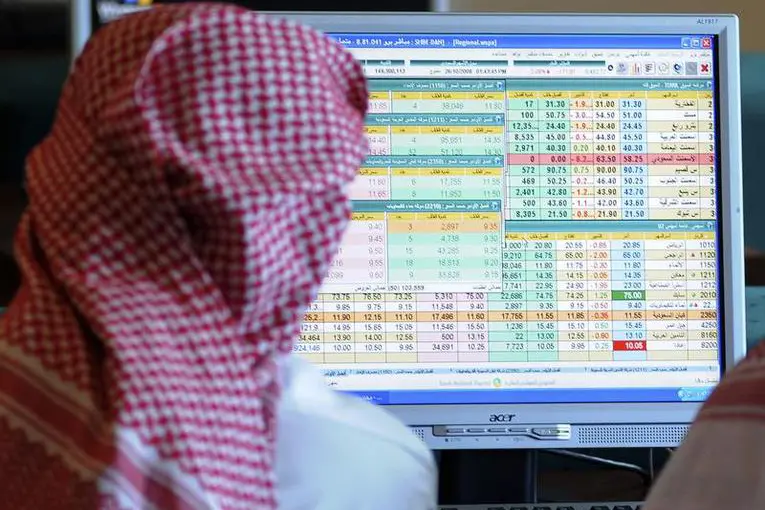PHOTO
Sunday, Jun 14, 2015
Dubai: The opening of Saudi markets will likely encourage companies that prefer to resort to primary listings while raising the level of disclosures and giving debt markets a boost as investors, financiers and owners become more comfortable.
The size of the Saudi market, which opens its $530 billion (Dh1.95 trillion) equities market to foreigners on Monday (June 15), is equal to the size of the South African, Russian or Turkish bourses. It is the one of the last few markets to open its doors to international institutions. Analysts say the benefits are many.
“I think the opening up of Saudi markets would encourage companies to come up with initial public offerings, and also raise the bar for compliance and disclosure standards,” Saleem Khokhar, head of equities at NBAD’s asset management group, said.
He added that “the regulator is quite strong and would tighten up the disclosure norms slowly but surely.”
Mohammad Shabbir, head of equity funds & portfolios at Rasmala Investment Bank concurred.
“The Saudi market is quite regular in bringing IPOs at regular intervals and I’m sure this would increase going forward as local investors would have more access to primary listings,” Shabbir said. “I think the speed would increase.”
Gradual rise in liquidity
Analysts expect liquidity to come in gradually and to gain pace after the market is upgraded to Emerging Market status.
“[The] Saudi [markets] will see a more gradual opening up as people get access to those markets. As [the market] goes [for] emerging market status in 2017, we could see money necessarily having to flow,” Khokhar said.
Franklin Templeton expects a weightage of 3-4 per cent for the Saudi market after it is upgraded.
“[Regarding the] Saudi [market] within the current framework, we estimate that [it] could command anywhere between 3-4 per cent of weightage in the MSCI Emerging Market [index],” Salah Shamma, head of investments at Franklin Templeton Investments Corp. “As we open the market to qualified financial investors, Saudi would be a strong candidate to be upgraded to emerging market status.”
Global index providers like the MSCI and the S&P Dow Jones have stand-alone indices for the market currently. Arqaam Capital expects flows of $40 billion over the next five years.
Better inflows in the secondary market would open up opportunities for exit opportunities for private equity investors. According to Shabbir, markets could also be revitalised as long as the pace of IPOs increases.
Analysts expect the opening up to also improve financing opportunities and allow entities to revisit their businesses’ risk ratings while improving the range of options available.
Meanwhile, the regulator will allow institutional investors with $5 billion of assets under management to invest directly in the stock markets, with the regulator retaining the discretion to limit it to $3 billion.
Disclosures
Rasmala’s Shabbir said while the disclosure levels of Saudi markets were quite good, authorities were pushing for further improvements outside the financial sector. Efforts are ongoing to get companies to apply International Financial Reporting Standards (IFRS), thus improving transparency as compared to other markets in the Gulf region.
The regulator played a proactive role in Mobily, which stunned investors after slashing 18 months of previously announced profits last November.
‘Too big’
Frank Templeton’s Shamma said the Saudi government cannot depend on its own internal liquidity to finance its economy as it’s getting too big.
The rapid drawdown in reserve assets suggests that the government is soon likely to opt for domestic borrowings. This is expected to gradually arrest the decline in government deposits.
Analysts said with a highly liquid and well-capitalised banking system, the Saudi financial system can easily absorb sovereign domestic borrowing without that having a major impact on lending to the private sector.
Government debt issuance is expected to boost banking sector profitability as these debt instruments provide banks with low risk-weighted and longer-duration lending opportunities, something that could enhance earnings.
The opening of the Tadawul (the Saudi Stock Exchange) to qualified foreign investors come Monday is a welcome development that will help deepen the equity market and broaden the investor base.
“The depth of the local debt market will be enhanced [through] the issuing of more debt and sukuk,” said Tim Callen, team leader of the IMF Article IV consultation. “Government debt issuance to finance part of the fiscal deficit would help in starting to build a benchmark yield curve, an important step in developing the debt market.”
The decline in oil prices has emphasised the importance of economic diversification. Policies are continuing to strengthen the business environment, but more needs to be done to encourage firms to focus more on tradable rather than non-tradable production in the non-oil sector.
By Siddesh Suresh ?Mayenkar Staff Reporter
Gulf News 2015. All rights reserved.





















